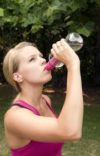Dear Nancy,
I had bariatric surgery a year ago. I’m now training for the Chicago Marathon. The bariatric diet is meant to be high protein low carb. I’ve maintained the high protein part and I’ve also incorporated lots of carbs. I am maintaining my weight fine. My question is about sport drinks. I choose the zero calorie ones because we are advised to eat a low sugar diet. Some other runners are telling me the full sugar versions are more effective. Is that true?
I can tolerate sugar fine, I don’t get dumping syndrome. I’m wondering if there is any special advice you can think of for me to combine my bariatric and athlete nutrition needs.
Thanks very much.
Dear Aspiring Marathoner,
First off, congrats on choosing to live an active lifestyle as part of your weight management plan.
As for how to best hydrate during your long training runs: When you are exercising for more than one hour, all marathoners (bariatric and otherwise) want to consume:
1) some type of energy to maintain your blood glucose level, and
2) some type of fluid to reduce your risk of becoming dehydrated.
A sport drink provides both sugar and fluid. So do orange sections, watermelon, jelly beans + water; there are many ways to get sugar + water. Given you are unable to tolerate a large volume of food or fluid, you want to fuel your long runs with either watery foods or drink fluids with calories.
In hot weather, if you are sweating heavily, you might benefit by eating some salty food before you run, such as sprinkling salt on an egg or in oatmeal. During the long run, you could include pretzels + water instead of getting sodium from a sport drink.
Because each person is unique, your job as a (bariatric) athlete is to figure out a variety of foods that works best for your body. If you were an “typical” runner, you’d want to target about 200 to 300 calories of carb per hour. If you, as a bariatric athlete, consume 50 to 100 calories per hour, you will get enough fuel to help maintain your energy. This will help you run better and recover better—to say nothing of add enjoyment to your training sessions.
For more sports nutrition tips, you might want to read my Sports Nutrition Guidebook. It would offer more information to help you achieve your goal.

